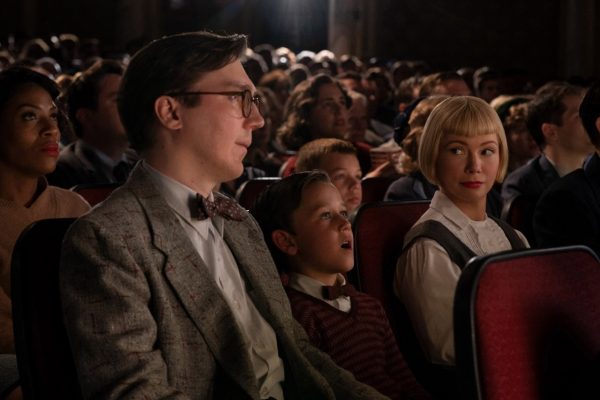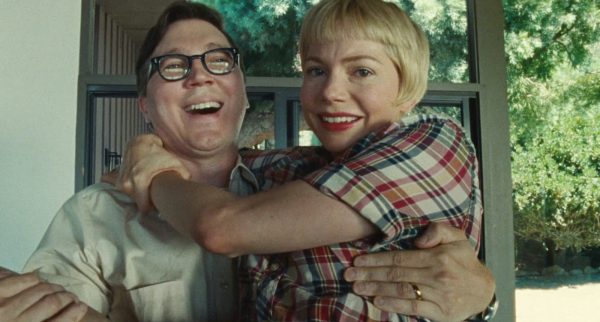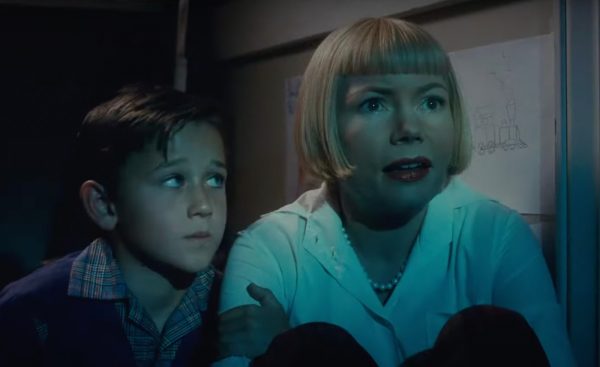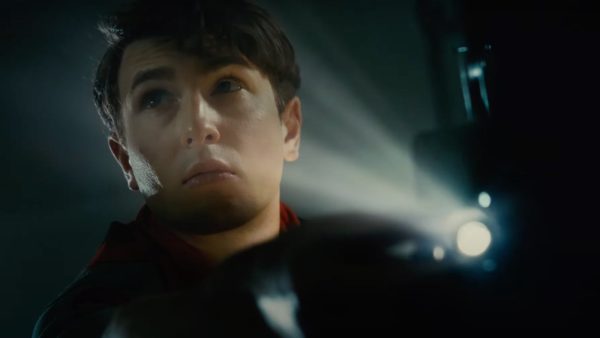The Fabelmans, 2022.
Directed by Steven Spielberg.
Starring Gabriel LaBelle, Michelle Williams, Paul Dano, Seth Rogen, Judd Hirsch, Julia Butters, Jeannie Berlin, Robin Bartlett, Keeley Karsten, Sophia Kopera, Mateo Zoryon Francis-DeFord, Birdie Borria, Alina Brace, Sam Rechner, Oakes Fegley, Chloe East, Isabelle Kusman, Chandler Lovelle, Gustavo Escobar, Nicolas Cantu, Cooper Dodson, Gabriel Bateman, Stephen Matthew Smith, Lane Factor, James Urbaniak, Alex Quijano, Kalama Epstein, Connor Trinneer, Greg Grunberg, David Lynch, and Jan Hoag.
SYNOPSIS:
Growing up in post-World War II era Arizona, young Sammy Fabelman aspires to become a filmmaker as he reaches adolescence, but soon discovers a shattering family secret and explores how the power of films can help him see the truth.
In Steven Spielberg’s skillfully crafted but structurally messy and tonally inconsistent autobiographical The Fabelmans (co-written alongside frequent collaborator Tony Kushner), Sam Fabelman’s (the teenage Steven Spielberg stand-in played by a compelling Gabriel LaBelle) seemingly manic depressed mother, Mitzi Fabelman (Michelle Williams giving it her all in a film that is confused on what to do with her) alleviates a moment of family dysfunction by standing up on a table and enthusiastically announcing that she has started therapy. The scene is played for humor and admittedly works, but it also serves as a breaking point that the film is never going to detail and treat her mental health beyond the enormous performance that sometimes feels authentic and other times feels mawkish.
Technically, this is a movie about Sam Fabelman (or Steven Spielberg, depending on how you look at it). It could also be that The Fabelmans is directed from the perspective of Steven Spielberg’s truth, his knowledge, and what he remembers of these events, filtered through his childhood thoughts and feelings. After all, The Fabelmans is a film about how movies and storytelling allow directors control over narrative and character. However, that still doesn’t exonerate Mitzi from appearing as an overly showy character, while dad Burt Fabelman (Paul Dano) is far more fleshed out with grounded dialogue.
There’s a moment where Sam decides he finally has to show his mother a home movie that will change their relationship forever from something relatively sweet and inspiring (she is the one that first gifted his young self, played by Mateo Zoryon Francis-DeFord, a camera, and the nudge to make movies, paralleling her artistic passion as a pianist before her housewife days) to cold and distant.
It’s one of the few restrained bits of acting Michelle Williams is granted, elevating the sequence from emotional to devastating (also accentuated by an outstanding John Williams score). This is not just a scene that changes the dynamic between mother and son but proof that captured footage contains hidden layers capable of revealing new interpretations. The power of moving images is fully on display, with Michelle Williams brilliantly reacting and affected by what Sam is getting off his chest by playing it.
When The Fabelmans leans into storytelling as a real-world tool and how it affects real people (another satisfying segment involves the depiction of a high school bully and how, through selective footage, the screen can convince viewers what to think about that individual), it is original and feels as if Steven Spielberg is demonstrating that making movies has typically always been a way for him to work through family history regardless of genre and that the camera is the greatest weapon in any storyteller’s arsenal.
Meanwhile, the rest of the film is an episodic assemblage of critical moments in Sam’s teenage life, whether it be multiple moves across America, his father’s jokey best friend Bennie (a winning turn from Seth Rogen imbuing his humorous side with something dramatic) supporting his interests, a lesson from a rousing Judd Hirsch as uncle Boris on balancing art and family (and how blending the two can either be destructive or emotionally healing), anti-Semitism from high school jocks, a death in the family, the construction of several home movies (generally westerns and war movies that are re-creations of Steven Spielberg’s personal home movies, which clearly went on to inspire future works), his first girlfriend (coming with some seriously cringe religious humor, even if the film does arrive at an intriguing analysis on Jewish and Christian faith being used for different purposes), David Lynch stepping in as a legendary filmmaker I won’t name here that gives Sam his industry start (an uproariously captivating portrayal with liveliness and magic other aspects of the narrative could have used), and a rift between him and his parents.
All of these diversions are consistently entertaining but lack a narrative cohesion that prevents one from feeling like they are sifting through a Wikipedia page on Steven Spielberg’s teenage years. Not to mention, because there is so much to touch on, some of the more serious material is softened and played safe. Aside from Sam’s work with cameras and endearing home movies (they increasingly become more complex in terms of practical effects and sound design), much of The Fabelmans is standard drama tackling too much to a degree that little of it resonates with impact. At least when the camera is not involved, anyway.
And while the juxtaposition between Sam’s love for moviemaking to his father’s computer engineering dedication at the cost of family stability is a high point, that level of care not going into his mom’s character serves as a counterweight to the film’s quality as a whole. Michelle Williams acting the hell out of the role simply doesn’t salvage that but rather imbues some of The Fabelmans with a sense of schmaltzy phoniness.
It’s kind of like the trainwreck disaster from Cecil B. DeMille’s The Greatest Show on Earth that both frightens and excites young Sam into wanting a camera; the spectacle itself of a masterful filmmaker pulling this deep from personal memories is exciting and absorbing, even if the whole is a head-on collision between competing subplots and characters.
Flickering Myth Rating – Film: ★ ★ / Movie: ★ ★ ★
Robert Kojder is a member of the Chicago Film Critics Association and the Critics Choice Association. He is also the Flickering Myth Reviews Editor. Check here for new reviews, follow my Twitter or Letterboxd, or email me at MetalGearSolid719@gmail.com
















